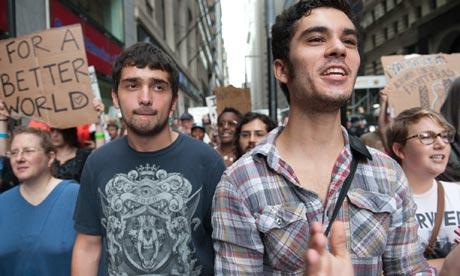A leaderless group of people gathered on Sept. 17 in New York City’s Zuccotti Park — now being referred to as Liberty Plaza — to protest. Protest what, exactly? Well, many things.
General dissatisfaction with our current political and economic climate sparked the protests, which have since spread to cities across the country and world.
The amorphous nature of the protests has made it difficult to pinpoint the motivations of those participating.
“It’s people reacting in different ways about something wrong with our country and where it’s going, and how policies advantage the affluent at the expense of typical households,” said Bob Williams, professor of economics.
People have different reasons for joining the protests. Each individual life experience affects how people define what they think is wrong with our country. Damon Akins, assistant professor of history, uses the parable of blind people describing an elephant to explain the impact of those differences in opinion.
The elephant could feel like a tree, a rope, or a fan, depending on which part is being described. In a similar way, each person describes problems in our country from their own perspective. Views on what is wrong with our economy and government vary from person to person.
“They can agree that something is wrong, something big,” said Akins. “But when they start to articulate it, they only highlight their distinctive experience of what is wrong.”
The Declaration of the Occupation of New York City, released Sept. 30 by OccupyWallSt.org, reflects those individual experiences. A few of the issues included grievances against the illegal home foreclosure process, corporate bailouts, corporate control of the media, and corporate influence in politics.
Clearly defined objectives for the protests have not yet been established. As President and Professor of Political Science Kent Chabotar explained, this ambiguity is both a strength and a weakness. The strength is that without specific objectives, greater numbers of protesters will join; but the weakness is that disaffection will likely occur as goals form.
“There will be some people who will continue with the movement, some who will drop out completely, and some who will coalesce with like-minded people,” said Chabotar.
Joe Cole, visiting assistant professor of philosophy, sees another benefit to the immediate move for action without objectives.
“The direct action has been productive in starting a conversation and bringing more people into the dialogue,” said Cole in an email interview. “It is also bringing some new ideas into the mainstream political conversation that has been either silent on issues of economic inequality or dominated by extreme conservative voices.”
According to ABC News, the initial idea proposal for the Occupy Wall Street protests came from Adbusters magazine, which pegs itself as opposing existing power structures. Akins explained that Adbusters has supported anti-consumerism for years, but such a message attracts more people in an economic climate like the current one.
“Populist rhetoric — that of anti-corporate, anti-bigwig, anti-elite — is always much more compelling in times of depression or recession,” said Akins.
Drawn together, whether by populist rhetoric or by the desire for change, most activist groups establish some form of governance or leadership. Instead of appointing leaders, however, the Occupy Wall Street protesters and those in other cities have been operating under consensus.
“The system we are fighting uses a facade of democracy to allow a small elite to call the shots,” said Mark Dixon, part-time instructor in art, in an email interview. “We are taught by American-style democracy that, to have any power, we have to subsume ourselves to large groups like Democrats or Republicans. By forcing the fit, we go for a safety in numbers but have to give up on many of our real issues.”
Dixon said that he is not heavily involved with the Occupy Greensboro movement, but that he is on his way in. Across the globe, others have found their way in also.
Anger-fueled action has spread to other cities across the country and world, culminating in an international day of protest on Oct. 15. People in Rome, Madrid, Dublin, Berlin, London, Paris, Hong Kong, Tokyo, and many other countries and cities protested in solidarity. Violence erupted in Rome as the protest turned into a riot.
On Oct. 1, 700 protesters were arrested for blocking traffic on the Brooklyn Bridge, according to ABC News. The arrest has been a controversial topic, however, because many protesters reported that they had been directed to walk in the road by New York City police.
In addition to the arrests, protesters have faced police barricades and many other obstacles put into place by New York City law enforcement. Police do not allow the use of microphones and megaphones in Liberty Plaza, so to compensate, protesters use what is called the human microphone — a system where the crowd around a speaker loudly repeats what that speaker says.
Despite the arrests and other deterrents, protesters show no sign of withdrawing in the near future, and the movement continues to draw attention to the common dissatisfaction with the nation’s politics and economic disparities.
Guilford community member and retired counselor Dennis Dressler spoke about the movement and the arrests. While attending a march in New York City on Wednesday, Oct. 5, he hoped to camp in Liberty Plaza that night, but there wasn’t enough room on the ground to put down a sleeping bag.
“If we do nothing, nothing will change,” said Dressler. “Anyone interested in change has the obligation to speak up.”
Thousands of people have spoken up across the country, including residents of Greensboro. To hear some voices from your neighbors, see the article in The Guilfordian’s News section.

